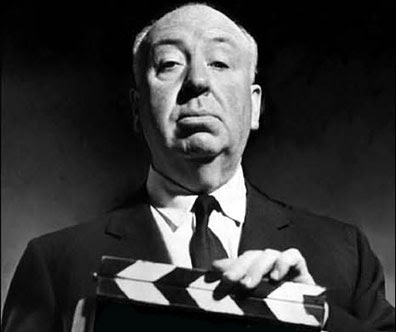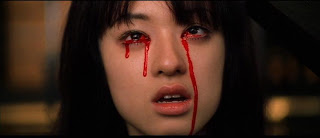In honor of this week's showing of Alfred Hitchcock's Vertigo, I decided to watch a bunch of the master's films that I hadn't seen yet. Here's some short reviews of them, along with my personal ranking of every Hitchcock film I've ever seen.
Sabotage - This is an adaptation of Joseph Conrad's novel The Secret Agent, renamed because the other film Hitchcock directed in 1936 was also called The Secret Agent. The local movie theatre owner (Oskar Homolka) is under surveillance by Scotland Yard as a suspect in a series of bombings around London. Sylvia Sidney, star of Fritz Lang's Fury and You Only Live Once, and 60 years later the alien-destroying Grandma in Mars Attacks!, plays Homolka's wife. Homolka's very good as a sap who gets manipulated into committing far greater crimes than he ever intended, but the signature sequence in the film, in which a young boy unknowingly carries a bomb through London (we see a clip of this in Inglourious Basterds) goes a little too far. With it, Hitchcock tested the limits of the audience's taste for suspense and learned that we'd react badly if he toyed with our emotions too mercilessly. It's really very unpleasant.
Saboteur - Similarly named but wildly different is this 1942 film starring Robert Cummings as a factory worker who's wrongfully accused of blowing up an aircraft factory in wartime. The movie basically feels like a rough draft of North By Northwest, with less charismatic actors and less of a sense of humor. The first hour of the film moves fairly slowly, as Cummings luckily finds a blind man who trusts him and slowly earns the trust of Priscilla Lane's pretty blonde model. The second half rushes across the country, dropping plot holes left and right in a rush to get the leads to the top of the Statue of Liberty, in a sequence apparently designed to give me an attack of vertigo.
Under Capricorn - My favorite of this whole batch of movies, and one of the bigger flops of Hitchcock's career. It's not a thriller, but rather a gothic melodrama set in 1830s Australia starring Joseph Cotton and Ingrid Bergman (whose scandalous relationship with Roberto Rossellini may have had as much to do with the film's failure as its lack of suspense). Like the previous year's Rope, it's as much an experiment in the use of the long take as it is a conventional film, and as such it feels at times like Hitchcock doing a Max Ophuls impression, with the long, stunning tracking shots weaving a dreamy sense of the snakelike interrelations between the characters and their pasts. Cotton plays an ex-con who's become rich but is tortured by his past. Bergman plays his alcoholic wife, similarly tortured by her past. When young Irishman Michael Wilding comes to town, he resolves to nurse Bergman back to health and uncovers the secrets both Bergman and Cotton (and the evil maid, Margaret Leighton (from John Ford's 7 Women) are hiding. It's a movie about two people who can't help destroying their own lives for each other's sake, which is about as Hitchcockian a theme as there is.
Torn Curtain - After Hitchcock's otherworldly run of films in the late-50s and early-60s (Vertigo, North By Northwest, Psycho, The Birds), any one of which could be considered his greatest, came Marnie, possibly his most psychologically disturbing and emotionally traumatic film. By the mid-60s, Hitchcock must have been exhausted, and so the fact that his next two films are relatively impersonal espionage thrillers should be no surprise. This beautifully composed 1966 film, starring Paul Newman and Julie Andrews is as solid a suspense film as you're likely to find. Newman plays a nuclear scientist who poses as a defector in order to worm a secret out of an East German scientist. Andrews plays his girlfriend who tags along, not knowing his scheme until halfway through the film (we know Paul Newman's beautiful, beautiful eyes could never betray his country, but she doesn't). The last two thirds of the film or so are constructed almost entirely out of textbook suspense sequences, as the two leads are either interrogated (often with a deadline) or chased across Berlin by communists, scientists and one mean ballerina.
Topaz - A worthy entry in the 1960s multinational epic thriller genre (think Guns of Navarone or Exodus) is this 1969 adaptation of Leon Uris's novel about spies on the eve of the Cuban Missile Crisis. John Forsythe (who looks like a weird mix of Humphrey Bogart and Richard Nixon, or maybe Jack Webb) plays the CIA agent who's Soviet defector has info on Cuba, and also of a spy ring in the upper echelons of the French government. He enlists French spy Frederick Stafford to go to Cuba and find out what's going on, and then expose the evil French guys. With John Vernon (The Outlaw Josey Wales, Animal House) as the bad Cuban, Karin Dor (You Only Live Twice) as the beautiful Cuban, Michel Subor (Le petit soldat) as Stafford's journalist son-in-law, Claude Jade (Stolen Kisses) as Subor's wife, Roscoe Lee Brown (The Cosby Show) as a French agent and Michel Piccoli (Contempt) and Philippe Noiret (Cinema Paradiso) as suspicious Frenchmen. Hitchcock keeps things moving briskly through its two and a half hour running time, making it one of the rare entries in its genre that isn't bloated and self-important.
Frenzy - Both a return to the dark psychology of his greatest films, and another experiment in what a filmmaker can get away with is this 1972 film, Hitchcock's first to earn an R rating. Finally free from censorship, he gives us another wrong man story, this time the hero being accused of serial-killing women with a necktie. We learn the identity of the real killer fairly early on, in a horrifying sequence in which the murderer rapes and strangles his victim. Hitchcock ruthlessly puts us in the midst of the scene, in what, like Sabotage, must have been the director trying to find out exactly how far the audience was willing to go (the sequence would not look out of place in the one of those horror films about torture that I don't go see). Just as disturbing, for me at least, are the scenes later in the film, when the Scotland Yard detective is served dinners by his wife, an aspiring gourmet. She gives him a fish soup that might be the most disgusting thing I've seen on film. It's a nasty film, and not nearly as tightly constructed as it should be, even by Hitchcock's MacGuffin-driven standards.
Family Plot - Hitchcock's final film seem like it comes from another world entirely. A screwball thriller more along the lines of The Trouble With Harry than any film he'd made over the previous 20 years. Barbara Harris (Nashville) plays a faux-psychic who is hired by an wealthy elderly woman to find her long lost nephew so that he can inherit the family fortune. Enlisting the help of her actor/cab driver boyfriend (Bruce Dern), the two uncover a lifetime of criminal activity committed by the nephew (William Devane), who now runs a kidnapping-based jewel collection racket with his girlfriend, Karen Black (also in Nashville). Dern makes a great detective, sarcastic and whiny and always chewing on a pipe while Devane, for some reason, talks like Jack Nicholson through the whole film. I don't know if that was an affectation, or just how he talked 35 years ago, but I have to say, it works. Together with Frenzy, it forms a fitting summary of the tensions running throughout Hitchcock's career: the combination of whimsically dark humor and disturbingly dark psychology that made him a truly great artist.
Finally, here is a ranked list of the 33 Hitchcock features I've seen, keeping in mind that I like all of these movies and every single one of them is worth seeing:
1. Vertigo
2. Rear Window
3. Psycho
4. North by Northwest
5. The Birds
6. The Lady Vanishes
7. Notorious
8. Rebecca
9. Suspicion
10. Under Capricorn
11. The 39 Steps
12. Shadow of a Doubt
13. Dial M for Murder
14. The Man Who Knew Too Much ('55)
15. Strangers on a Train
16. The Trouble with Harry
17. Torn Curtain
18. Lifeboat
19. Blackmail
20. Marnie
21. To Catch a Thief
22. The Wrong Man
23. I Confess
24. Family Plot
25. Rope
26. Topaz
27. Foreign Correspondent
28. The Man Who Knew Too Much ('34)
29. Frenzy
30. Saboteur
31. Spellbound
32. Sabotage
33. Jamaica Inn
































.jpg)


